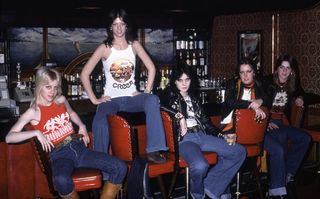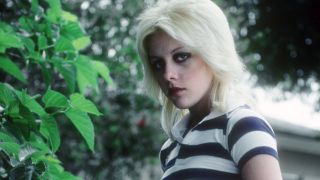Once described by Bomp! magazine as “the lost daughter of Iggy Pop and Brigitte Bardot”, Cherie Currie was the charismatic lead singer of The Runaways, the teen queens of noise who set the rock world alight in the 70s.
Did the success of the film The Runaways provide the impetus to get back to recording?
Absolutely. [former Runaway] Joan Jett asked me to open for her at the Pacific Amphitheatre in Orange County, right after the film had come out. We threw the band together fairly quickly, with the help of Matt Sorum, but I never expected the kind of response we received. We had well over nine thousand people that night, and young girls were coming up to me crying. It meant so much to me that what The Runaways went through, forty years ago, really did have an impact. Because for a long time I felt that we’d all been forgotten.

When and where were you happiest in The Runaways?
When we got off the plane in Japan [June 1977] and saw all these thousands of girls screaming for us. We needed a police escort because it was pure Beatlemania. It was a big shock, and we felt at that point like we’d really made it.
But then you left the band a few months later.
It had become so toxic. Jackie [Fox] had just cut her arms up and left, and there was so much animosity. Kim [Fowley, The Runaways’ manager] would pit us against each other because he felt it gave us an edge on stage. But he didn’t realise that when you feed lies to different band members it’s going to explode in the end. It’d been two years of touring and recording and nobody trusted anyone any more.
When you gave up music to work in a homeware shop, did you ever plan to return to the business?
Eventually I did, but I needed to heal myself; I’d been doing drugs for a lot of years. From the age of fifteen in The Runaways, it was like, if you didn’t do drugs there was something wrong with you. Unfortunately I also come from a background of alcoholics – my father died of alcoholism and my grandfather also suffered from the disease. It’s a genetic malfunction, a gene I’ll carry for the rest of my life. So folding linen for a living was me trying to get back to normal, because I didn’t know what normal was.
You wrote about those experiences in Neon Angel, which also includes a harrowing story about being kidnapped by a crazed fan when you were still in your teens.
Writing the book made me accept responsibility for so much of what happened in my life. I never play the victim card. Even with my kidnapping, I had to admit that I ignored the little voice in my head that said: “Do not get into this car with this man.”
Did you think you’d make it out alive?
No, because he told me I wasn’t going to. During about four hours of a brutal beating and rape, he kept telling me I was dead, like the other six women he said he’d killed in Dallas. But at one point, as he was dragging me, I saw a dinner knife on a counter, covered with peanut butter. And I committed myself, after trying to get away through a window, nude, to using it. If that had been a steak knife or butcher knife I would’ve stabbed him until long after he was dead, because that’s how terrified I was. If you’ve ever seen The Silence Of The Lambs, when the girl’s in the pit screaming and the guy starts screaming too because no one can hear her, that’s what he did to me. Unfortunately his lawyer plea-bargained in court and he only got a year in county jail.
Reverie includes new versions of two Runaways songs – American Nights and Is It Day Or Night – with your old Runaways bandmate Lita Ford. Have you now come full circle?
I wanted to pay homage to the band that made it all possible for me. And to the man, Kim Fowley, who, for all of his faults, was the mastermind and the drive behind The Runaways. So when he was very ill and asked me to make a record [Fowley co-wrote and co-produced the album], I jumped at the chance. It was time to come full circle and heal those old wounds, forty years later. I made my peace with Kim before he died, and cared for him at my house for nine days near the end of his life [he died of cancer earlier this year].
Jackie Fox recently alleged that Fowley raped her after a gig on New Year’s Eve 1975, while she was drugged and incapacitated. She also stated that you and Joan Jett were in the room but did nothing to help. Can you tell me what happened?
I was in the room that night. But what I saw was a giddy, high little woman who was telling Kim what to do to her, every step of the way. The sexual intercourse happened because she asked for it: “I want your cock!” Then she was asking him to fuck her harder and harder. I just got up and said: “This is fucking sick and I’m not watching.” And I walked out in protest, because I thought it was disgusting that Kim was doing such a thing, and I felt equally disgusted that Jackie was participating. She was new to the band, she was insecure, and I basically thought she was just doing it for attention. That’s the honest-to-God truth, on my son’s life. I have no animosity against Jackie, but she claims I did something she knows I did not do. The bottom line is I’m not a liar and I don’t like liars. I’m sorry, I might sound crass and cruel, but I just don’t buy any of it.



